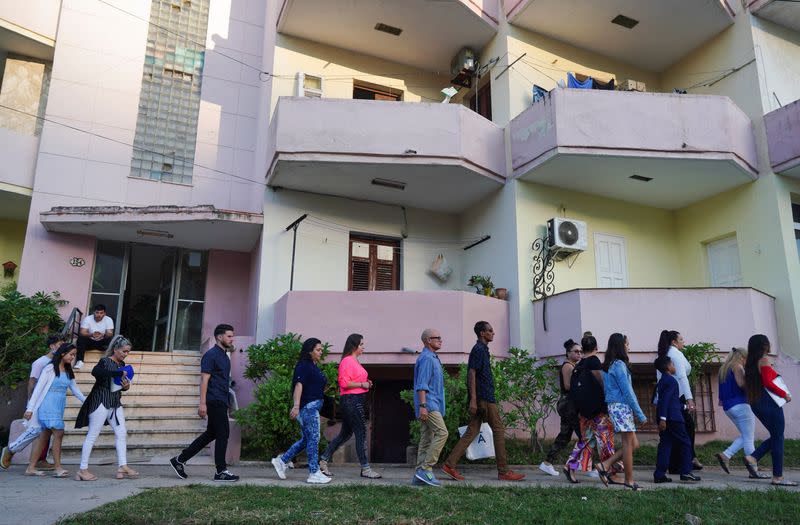HAVANA, (Reuters) – Cubans frantic to escape economic crisis at home weighed up options this week on how to move to the United States after the Biden administration rolled out a new set of rules at the U.S.-Mexico border that dramatically change the landscape for the island´s would-be migrants.
The new regulations block Cubans at the border, putting the brakes on a route to the United States favored by many: a flight to Nicaragua, which lifted its visa requirement in 2021 on Cubans, and then an overland journey north through Central America and Mexico to the border.
But the fresh regulations also open a new avenue to enter the United States legally, aimed at bringing order to a record-breaking exodus in 2022 of upwards of 220,000 Cuban migrants encountered at the U.S.-Mexico border.
“It remains to be seen whether Cubans will wait their turn in the legal migration system, or continue to attempt to cross the land and sea borders of the United States without official authorization,” said Jorge Duany, a professor with Florida International University in Miami.
In October 2022, the United States imposed a similar “carrot and stick” approach to migrants from Venezuela. Venezuelans arriving at the southwest U.S. border plunged from 1,100 per day to under 200 per day in just one week, U.S. figures show.
The Biden administration has bet Cubans will respond in the same way, helping to slow the pace of illegal immigration.
Cubans in Havana, for whom many migration is a constant subject of conversation, said they welcomed new options but told Reuters it was not yet clear how many could take advantage.
The rules allow migrants outside the United States to apply for a two-year “parole” period that would allow them to travel legally to the country. The process requires safety and health screenings and that Cubans identify a U.S. sponsor who will be financially responsible for them.
“The {new system} is for those who have family there,” said 26-year old Havana resident Rafael Rodriguez, who said the rules had set off a scramble to identify sponsors.
“There are a lot of people like me that don´t have anyone to sponsor them.”
But for 19-year old Daniel Gonzalez, of Havana, who said he had close friends take the dangerous overland route north through Central America, the new process is a welcome relief.
“It gives us a legal option…so we can travel to the United States without having to run great risks,” he said.
The Cuban government said it too seeks to encourage legal and orderly migration, but has long blamed the Cold War-era U.S. embargo for strangling the island´s economy and encouraging its youth to emigrate.
The Biden administration has acknowledged “economic sanctions” are among the key factors driving immigration, but last week´s policy change did not address the embargo.
Until the economy improves, taxi driver Osmani Mulet said new rules won´t be enough to restrain those who want to leave.
“Cubans will always find a way to migrate,” he said. “If not to the {United States,} then to someplace else.”

